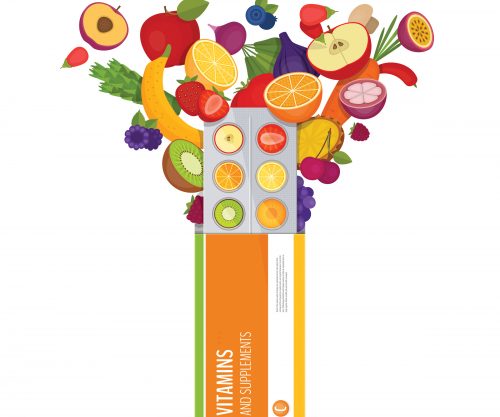
Often touted as immune system super-boosters, vitamin C supplements are put to the test by Healthy Food Guide.
You might notice in winter that big jars of vitamin C supplements appear on retail shelves, but the wide variety of choices means it’s important to know why and what we’re buying.
Vitamin C (or ascorbic acid) is one of the water-soluble vitamins. This means we need it regularly to make sure we have enough. Vitamin C plays an important role in our body as an antioxidant. It may help to prevent damage to the body caused by the free radicals that can be involved in developing cancers and heart disease. Vitamin C also helps improve absorption of plant-based iron, is involved in keeping our immune system working well and helps to heal wounds.
How much vitamin C do we need?
The recommended dietary intake (RDI) of vitamin C for adults is 45mg per day, however, that’s just the starting point. Guidelines have set a suggested dietary target (SDT) for vitamin C each day to help reduce chronic disease risk at 190mg for women and 220mg for men.
When You might be low in vitamin C
Vitamin C deficiency is called scurvy. Symptoms include fatigue, poor wound healing, swollen and bleeding gums, loose teeth, joint pain and iron deficiency anaemia.
You might be low if you:
- Have a limited fruit or vege intake
- Fruit and veges have the highest vitamin C in them and any time your intake of these is limited for long periods, you’re at risk of not getting enough
- Are a smoker or a passive smoker
- Smoking reduces vitamin C levels in the body as more is needed to manage the free radicals that come from smoke
- Have a malabsorption condition
As vtamin C is absorbed through the intestines, medical conditions that affect how nutrients are absorbed can affect the amount of vitamin C available.
Each of these foods provides around 60-70mg vitamin C
- 1 green kiwifruit
- 1 orange
- ¾ cup steamed broccoli
- ¼ red capsicum
- 2 medium tomatoes
- 12 strawberries
- 1 cup cooked cauliflower florets
Five servings of fruit and vege each day provide around 200mg of vitamin C.
What’s the evidence for vitamin C and colds?
Taking a vitamin C supplement before and during a cold may reduce the length of your cold by half a day. But taking a vitamin C supplement when you come down with a cold may make no difference to your symptoms or how long you’re sick for.
Other research suggests those who may benefit from a vitamin C supplement to reduce symptoms of a cold are very physically active people (using up a lot of vitamin C) or people at risk of having low body stores.
Which supplement is best?
Research suggests taking more than 400mg vitamin C daily doesn’t result in more vitamin C in the blood. Any leftover vitamin C is removed in urine. On the shelves you’ll find liposomal vitamin C, esterified vitamin C, calcium ascorbate, vitamin C with bioflavonoids, ascorbic acid and sodium ascorbate.
Liposomes are thought to protect the antioxidant effects of vitamin C during storage. Taking high doses of sodium or calcium ascorbate may push your daily calcium or sodium intake up. Taking vitamin C in combination with bioflavonoids is thought to increase bioavailability of vitamin C, but this isn’t supported by research. Whether you take plain ascorbic acid or fancy vitamin C combos doesn’t seem to improve how much you get.
Side effects
Too much vitamin C from supplements can cause diarrhoea, nausea and stomach cramps.
Article sources and references
- Hemilä H. 2017. Vitamin C and infections. Nutrients 9:339https://www.mdpi.com/2072-6643/9/4/339
- Johnston CS et al. 2014. Vitamin C supplementation slightly improves physical activity levels and reduces cold incidence in men with marginal vitamin C status: A randomized controlled trial. Nutrients 6:2572-83https://www.ncbi.nlm.nih.gov/pubmed/25010554
- Levine M et al. 2011. Vitamin C: A concentration-function approach yields pharmacology and therapeutic discoveries. Advances in Nutrition 2:78-88https://www.ncbi.nlm.nih.gov/pubmed/22332036
- Linus Pauling Institute. Supplemental forms. The bioavailability of different forms of vitamin C (ascorbic acid), lpi. oregonstate.edu Accessed July 2018https://lpi.oregonstate.edu/mic/vitamins/vitamin-C/supplemental-forms
- Marsanasco M et al. 2011. Liposomes as vehicles for vitamins E and C: An alternative to fortify orange juice and offer vitamin C protection after heat treatment. Food Research International 44:3039-46https://www.academia.edu/32448674/Liposomes_as_vehicles_for_vitamins_E_and_C_An_alternative_to_fortify_orange_juice_and_offer_vitamin_C_protection_after_heat_treatment
- National Institutes of Health. Vitamin C. Fact sheet for health professionals, ods.od.nih.gov Accessed August 2018https://ods.od.nih.gov/factsheets/VitaminC-HealthProfessional/
- Ran L et al. 2018. Extra dose of vitamin C based on a daily supplementation shortens the common cold: A meta-analysis of 9 randomized controlled trials. BioMed Research International ID 1837634https://www.hindawi.com/journals/bmri/2018/1837634/
www.healthyfood.com










